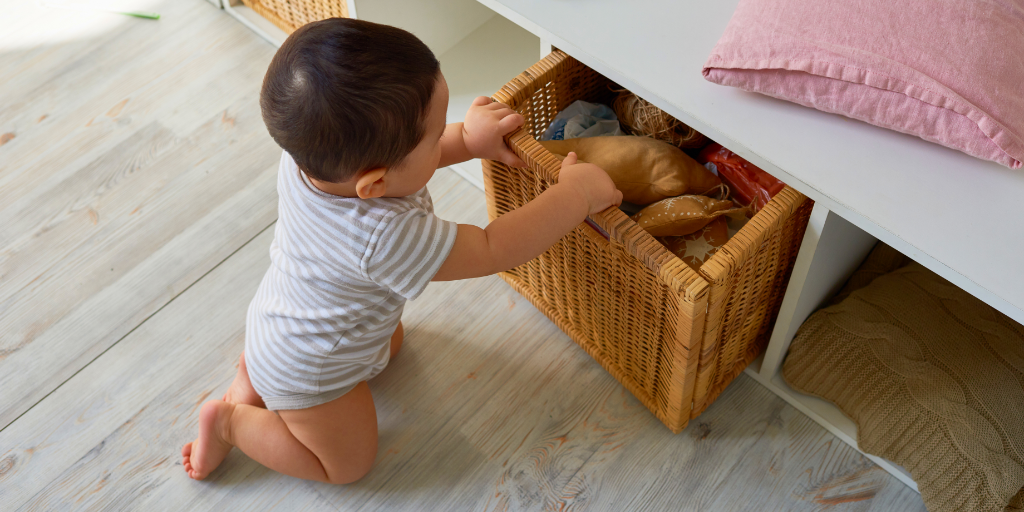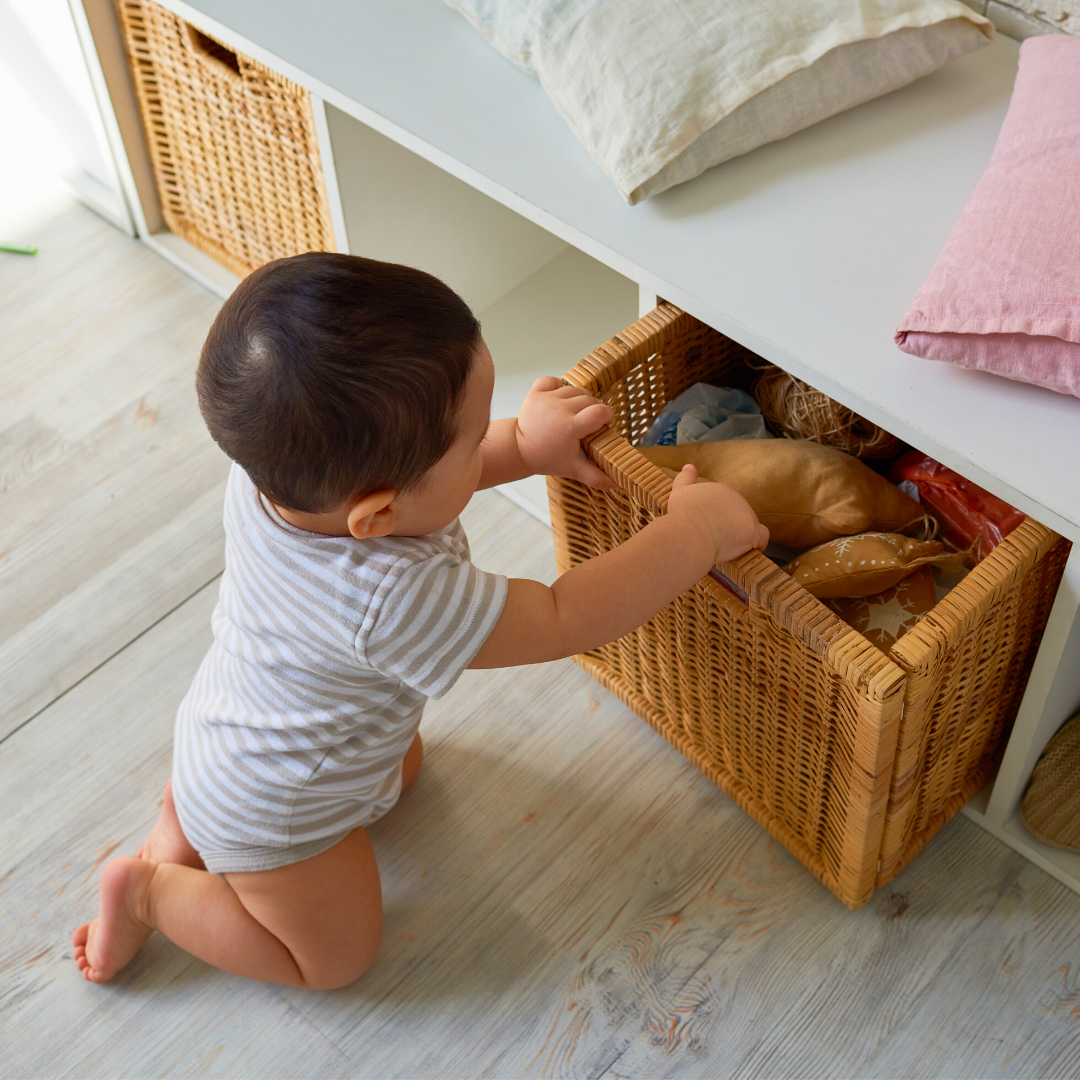
Caitlan Rangel offers a Catholic perspective on decluttering based on the theological virtues of faith, hope, and charity.
We are nearly through the twelve days of Christmas, and I don’t know about you, but I’m itching to declutter. I love the Advent and Christmas seasons, and something in me is also eager for the opportunity of daily discipleship that Ordinary Time offers—even if it’s just for this short pocket of time before Lent.
Though we did some simplifying and giving away during Advent, our home still experienced an influx of new things with Christmas. That’s an incredible gift, and also—we still need to be able to live and love one another well in our home and clutter can get in the way of that.
How do we declutter in a way that is a lifestyle and not a quick fix that won’t last? It seems that simplicity becomes sustainable when it goes hand in hand with growth in Christian virtue—something that marks our lives as disciples on the journey.
A virtue is an habitual and firm disposition to do the good. It allows the person not only to perform good acts, but to give the best of himself. The virtuous person … pursues the good and chooses it in concrete actions. (Catechism of the Catholic Church 1803)
Don’t you love how practical this is? A virtuous person pursues the good and chooses it in concrete actions.
So, how can we apply this to simplifying and decluttering our homes in the New Year? I think we move more deeply into the virtues to the theological virtues of faith, hope, and charity.
[The theological virtues] are the foundation of Christian moral activity … They are infused by God into the souls of the faithful to make them capable of acting as his children and meriting eternal life. (1813)
Is this too extreme for decluttering our homes? Given how many shows, magazines, books, and podcast episodes exist about simplifying and decluttering—I don’t think so. Stuff has become a stressor and hindrance to living peacefully and loving each other well. It seems like we need the Lord’s help here.

Faith
Faith is the theological virtue by which we believe in God and believe all that he has said and revealed to us. (1814)
Do we believe God is who God says He is? Do we believe that God is trustworthy, that God will provide for us?
Sometimes we hold onto excess things (or multiple of a specific item) because we fear we may need it someday. We keep more than we need because we are anxious about a multitude of situations the future may hold and we want to be prepared for all possible scenarios.
Do you hold on to more than you need out of fear? Do you keep an excess of things because you don’t trust deep down that God will provide in a situation of need?
Perhaps one element of decluttering this year can be an exercise in faith that God will provide. If you have three can openers, can you give away one or two? If you have a bin of extra shirts or sweaters tucked away just in case you need them, could you give away half that bin? If you have an excess of children’s clothes (maybe some with the tags still on them), could you give some away?
There’s no situation too ordinary for stretching the muscle of trusting the Lord.

Hope
Hope is ultimately about heaven, and it begins here and now.
The virtue of hope responds to the aspiration to happiness which God has placed in the heart of every man; it takes up the hopes that inspire men's activities and purifies them so as to order them to the Kingdom of heaven; it keeps man from discouragement … Buoyed up by hope, he is preserved from selfishness and led to the happiness that flows from charity (1818).
The virtue of hope leads us onward. It’s God nudging us toward eternal happiness.
Now, what does that have to do with decluttering?
I think it reminds us that there’s a better way here and now. Our clutter or mess or piles of things don’t have to stay that way. Having a cluttered home, bins of laundry, and a pile of dishes in the sink doesn’t need to mean: “I’m a messy person.” “I can’t keep anything organized.” “I’m a terrible homemaker.”
We can make changes. We can form habits and grow in our ability to be virtuous people—to actively pursue and choose the good.
Motivated by our desire for peace and positive familial connection, we can set a timer for five to ten minutes and see how many dishes we can get done. We can create habits at lunchtime and before bed to tidy up—even the littlest ones can help push in chairs or pick up toys with a little direction from mom and dad. We can tell ourselves: “I’m someone who puts my folded laundry away.” “I can roll up my exercise mat after doing a workout.” “I can tidy up because I like waking up to a peaceful space in the morning.”
God wants to give us the grace of hope for the happiness of our heavenly home—and it can begin in our homes on earth.

Charity
God’s gift of charity can be a motivator for decluttering at this time or any time of year.
Charity is the theological virtue by which we love God above all things for his own sake, and our neighbor as ourselves for the love of God. (1822)
Seeking to live charity is a life’s work. Thanks be to God, it can start small and in our homes. As parents, we strive to practice charity daily with our children and spouses. We ask God for the grace to be humble, compassionate, and selfless in our love.
We can take the same approach to our belongings with the most vulnerable in mind. If we can see with eyes of abundance—how we have so much, even if we feel like we are working with little—we can give more easily. We can ask God for the grace to be grateful for what we have, to see what we can go without, and to give freely.
I also find that my children are most inspired to give when we speak with the lens of charity for our brothers and sisters in need. When we approach giving away toys or clothes through language of helping other children or families, our children give with greater freedom and generosity.
One of the great beauties of our faith is that there’s always more than meets the eye. Asking God to lead us along the path of virtue—of pursuing and choosing the good—can start small, but then it expands. God meets us where we are—in all of the clutter—and leads us into more abundant life.
Copyright 2023 Caitlan Rangel
Images: Canva
About the Author

Caitlan Rangel
Caitlan Rangel likes making bread and books. She is a wife and homeschooling mom, and the author of the children’s picture book, The Restless Grain: A Tale of Hope. Caitlan holds a B.A. in Theology and Master of Divinity from the University of Notre Dame. She lives in Southern California on the canyon where she grew up. Connect with Caitlan on Instagram @restandrise.caitlanrangel, her website at CaitlanRangel.com, and Substack.


.png?width=1806&height=731&name=CatholicMom_hcfm_logo1_pos_871c_2728c%20(002).png)
Comments